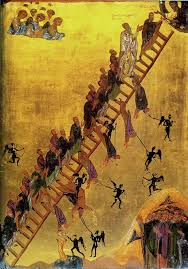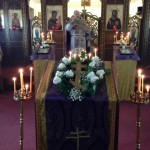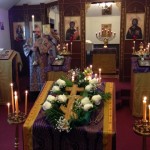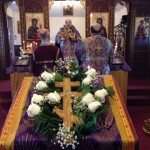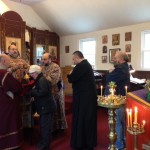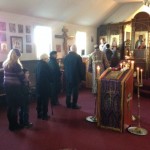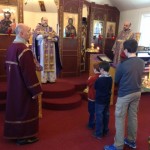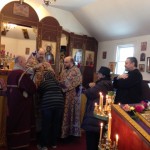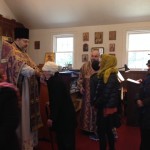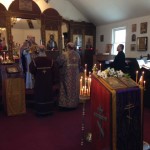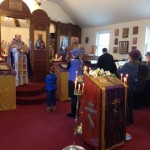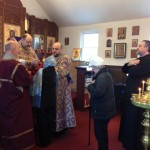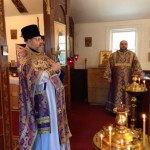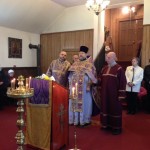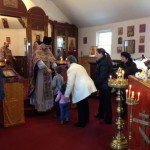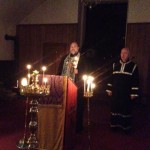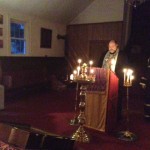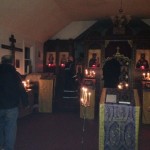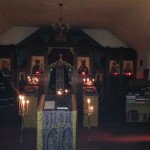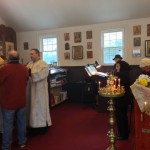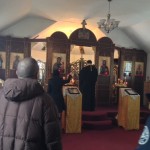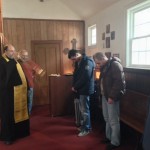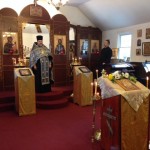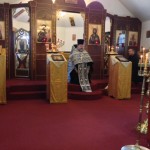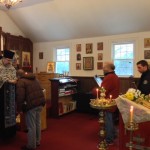On March 30, on the Fourth Sunday of Lent the Rector of St. George Church, Archpriest Igor Tarasov celebrated Divine Liturgy in our temple. After the Scripture readings he preached a homily:
“Fourth Sunday of Lent is dedicated to the great spiritual writer and champion of faith, Venerable John Climacus. His book about achieving spiritual perfection in monastic life, called “The Ladder of Divine Ascent” is very famous among the Orthodox who desire to conduct a life of prayer and spiritual endeavors. The Ladder describes how to raise one’s soul and body to God through the acquisition of ascetic virtues. Each chapter is referred to as a “step”, and deals with a separate spiritual subject. There are 30 steps of the ladder, which refer to the age of Jesus at His baptism. Commemorating St. John of the Ladder the Church wishes us to be patient in our own spiritual life, in our achievements and failures during this difficult journey. We need patience to have hope that we may be successful in our salvation.”
“In today’s Gospel lesson our Lord Jesus Christ Himself showed that being a man He had to exercise patient, but was about to lose it. He exclaimed that He is tired to live among the faithless people and to bear with them (Mk. 9, 19). Today’s Epistle lesson is also telling us something about patience and about hope. Those two virtues always go together. If we have hope we must have patience to wait for a hope to be fulfilled. If we have patience, then we can hope for anything. St. Paul calls us today to “imitate those who through faith and patience inherit the promises” (Heb. 6, 12). Then St. Paul tells us about Abraham. God had promised to multiply the seed of Abraham. But Abraham had to exercise patience before he received the promise. It was not until 25 years after God’s promise that his son Isaac was born. Abraham was old, his wife Sarah was barren, but Abraham waited patiently, trusting in the promise of God.”
“Imagine waiting 25 years for God to fulfill a promise! That a patience! That a hope! Contrast this with the mood today which everything to be instant. Instant sound from the radio, instant direct-dialing to any spot of the world, instant photos, instant riches, instant food, instant divorce, instant suicide… So people ask: “Why not instant prayer? Why wait for 25 years, as Abraham did, for an answer to prayer? Why not right now?””
“When a father asked a college dean for an instant education for his son who did not want to spend 4 whole years in college, he received a reply: “Certainly, I believe I can arrange for that. Of course, it all depends on what you want to make of your boy. When God wants to make an oak tree, He takes a hundred years. When He wants to make a squash, He takes only two months”.”
“We need patience in order to achieve our goals. This is why St. John of the Ladder describes the whole 30 steps in achieving perfection in ascetic life. On the 30th step of the Ladder is God Himself. And we have to say that God, being a perfect example of everything which is good, is the supreme example of patience. He is patient with each one of us, always giving us another chance, another year, another opportunity to repent, to return to Him. He is ready to wait for us to bear fruit for Him like a fig tree in a parable told in the Gospel (Lk. 13, 8-9).”
“If God Himself is patient with our sins, our transgressions and evil deeds then we should learn to be patient. We see that we usually want everything instantly, but God is the One who knows how to wait. Therefore, let us admit that patience is not a human achievement. It is a fruit of the Holy Spirit within us (Gal. 5, 22). We must pray for it. It is a virtue we receive when we live in Christ.”
“Having patience as a fruit of the Holy Spirit, as a virtue obtained in a pious life, we may have hope. St. Paul in today’s Epistle lesson calls the hope “an anchor of the soul, both sure and steadfast, and which enters the Presence behind the veil” (Heb. 6, 19). What a beautiful description! An anchor is usually thrown from a ship to secure it in a certain place. Thus St. Paul compares our soul to a ship wandering in the storms of the sea of life. The hope makes it secure, it is an anchor of our soul. This anchor is both sure and steadfast. It also reaches not the depth of the sea, but it enters behind the veil of God’s essence, of the very existence of the Almighty which is a mystery. But through Jesus Christ who became man we can reach there by hope. Christ, as St. Paul says, was the forerunner who entered behind that veil for us (Heb. 6, 20). Just like a high priest in the Temple of Jerusalem could enter behind the veil of the Holy of Holies to offer a sacrifice for the chosen people, so Jesus by His sacrifice on the Cross had entered behind the veil of God’s presence for us. He became High Priest forever according to the order of Melchizedek for the whole human kind. Heaven is still behind the veil for us who live an earthly life. But because of Jesus the High Priest heaven may be open for us when we leave this earth. Our hope is there. It is like an anchor of our soul firmly and securely fixed behind the veil.”
“Dear brothers and sisters! Let us be patient. Let us exercise patience and endure in our spiritual life to achieve fruitful results. Let us try to ascend to God step by step on the ladder which is described by Venerable John Climacus. Let us endure like Abraham to receive the promise of the Most High. Let us pray for the gift of patience, for this precious fruit of the Holy Spirit. Let us cherish our hope which can firmly unite us with God, our Lord Jesus Christ.”
Upon the Liturgy dismissal Fr. Igor called the parishioners to keep in mind the example of the Venerable Father Alexis, the Man of God whose memory we celebrate on that day. Orthodox Christians should imitate his humility and modesty.
